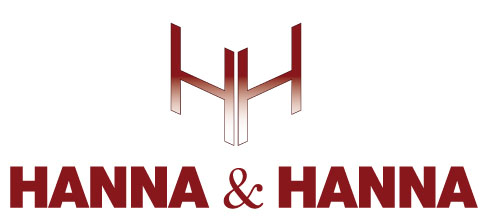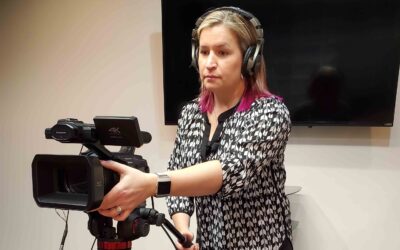History of the Shorthand Machine
With powerful on-demand legal services that go where you need them, Hanna & Hanna is your secret weapon and is proud to be Houston’s Premier Court Reporters and Litigation Support Providers.
The History of Court Reporters’ Key Tool!
The Stenograph Shorthand Machine (1877)
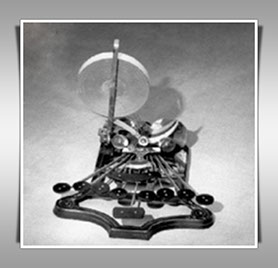
Miles Bartholomew (nicknamed the “Father of the Stenograph”) developed the first shorthand machine in 1877, the first machine to be regularly used in the court reporting field. Ten keys could be pressed singularly to create a series of dots and dashes (think Morse code).
Anderson Shorthand Typewriter (1889)
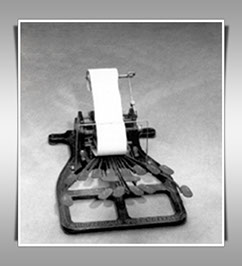
This machine, created by George Kerr Anderson, had the first keyboard that allowed multiple keys to be pressed at once. This typewriter used English characters instead of code, allowing words and symbols to be written.
Ireland Stenotype Shorthand Machine (1911)
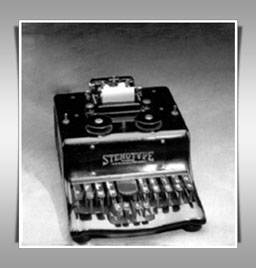
The Ireland Stenotype Shorthand Machine was developed by The Universal Stenotype Company and was 40 pounds lighter than its predecessor. It had a totally depressible keyboard, allowing reporters to record numbers and words phonetically with fewer strokes.
Master Model Stenotype (1914)
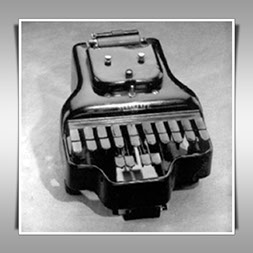
Also developed by the Universal Stenotype Company, this machine was even lighter at only six pounds instead of eleven. This was the last machine produced by the company, as it went bankrupt during World War I.
LaSalle Stenotype (1927)
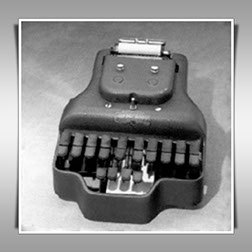
This machine differed from the others with its use of a two-spool ribbon system. Unfortunately, this was another company cut short by recession (the Great Depression). The court reporting industry as a whole slowed during this time.
Stenograph Shorthand Machine
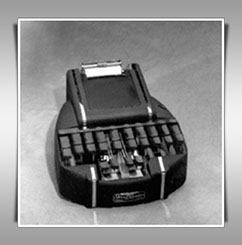
This machine came in two models: secretarial and reporter. The Secretarial a single 11-inch ribbon and held 100 folds of paper, while the Reporter held 300. As compared to the others, this machine was known for being quiet.
Stenograph Data Writer (1963)
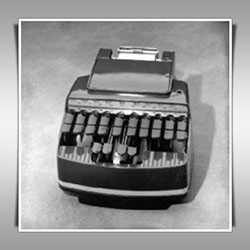
A good number of things changed with the Data Writer. It’s organ-type switches allowed for good contact and transmission with minimum key pressure. It encoded a magnetic tape with machine notes for computer transcription. Upon its release, it could be attached to a cable connected to a separate tape recorder. By 1970, cartridge was used, and by 1974 cassettes were used.
Stenograph Machine (1982)
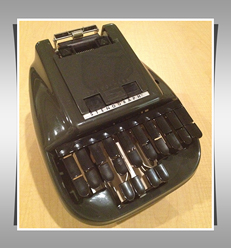
This machine has many of the same feature sof the previous model, but it was the first iteration to have a plastic shell, or casing. This made the machine more durable.
SmartWriter (1987)
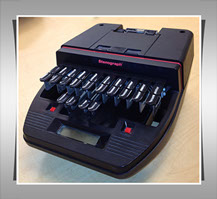
With computers more widespread, the SmartWriter was made with the ability to encode machine notes on a floppy disk, which was a massive change in the court reporting industry.
Court reporting wouldn’t be the same without the shorthand machine. Learn more about this the history of this game-changing tool below. Information and graphics from stenograph.com.
Stenograph Stentura Series (1992)
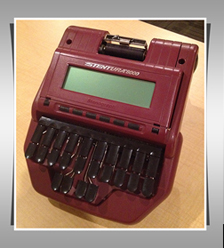
The Stentura changed the game by being the first machine to feature an LCD screen with instantaneous translation to be shown in English or Steno.
élan Cybra (2001)
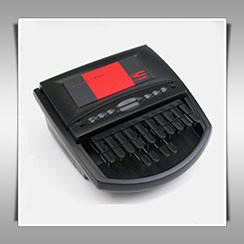
This was the first machine to be totally paperless, inkless, ribbon-less, and greaseless. An updated version was introduced in 2006, a new version was that included an optional wireless feature and designed for realtime transfer.
élan Mira Series (2003)
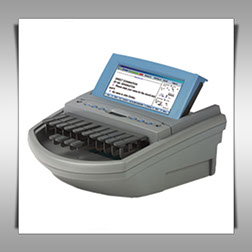
The Mira had an adjustable LCD screen for easier viewing and Audiosync® OTG – on the go!, a USB port for writing realtime, and a DB9 serial port for use with wireless Bluetooth. These changes set a new standard for court reporting.
Stentura Protégé Student (2005)
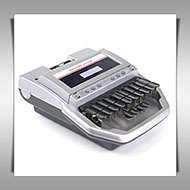
This machine was similar to its predecessors, but was designed specifically for students featuring USB and serial connectivity, as well as optional wireless realtime reporting.
Stentura élan Mira Student (2005)
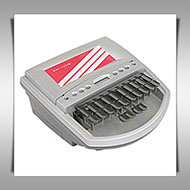
This was another great option for students affectionately known as the “paperless writer for students.” While it features the same technology as the professional version, it is in a limited fashion at a more student-accessible price.
Stentura Fusion (2006)
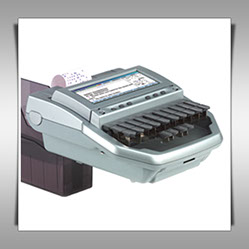
The key feature of this machine was its ability to use paper, or be paperless. It also included compatibility with SD cards, USB and DB9 ports, a battery status display, and the ability to record live testimony using AudioSync OTG – on the go!
The Diamante (2009)
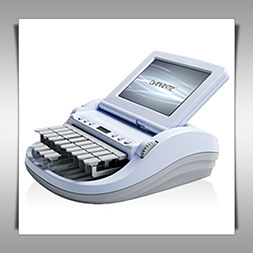
With the Diamante’s TrueStroke® technology, the industry took found a new standard for speed and accuracy. It featured a vibrant flat-panel display, two SD card ports, two USB ports, microphone and headset jacks for AudioSync, and Bluetooth or WiFi options for realtime translation.
The Luminex (2015)
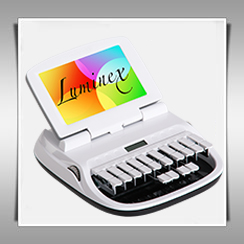
The Luminex has the most innovative technology and software in the game. Duel key channels keep keys properly aligned. Chrome-plated key levers reduce friction and provide smoother action while typing, and TrueStroke technology results in cleaner steno notes.
Professionalism
Hanna & Hanna Reporting is a full-service court reporting firm offering complete legal support services, videoconferencing and deposition suites. We provide a wide variety of services related to the court reporter profession, including realtime, transcription service, closed captioning, litigation support and legal video services.
Experience
We offer the professional technical support and legal support that makes your job that much easier. We are a member of NCRA, STAR, NNRC, TCRA, TEXDRA and HCRA. Hanna & Hanna Reporting is privileged to have an exceptionally dedicated and committed staff of professionals for all your court reporting needs.
Locations
Hanna & Hanna Reporting is headquartered in Houston, Texas and offers worldwide scheduling of depositions, court reporters and videoconferencing. Our Texas locations can provide local services across the region.
We are Covid-19 Proof!
Schedule A Remote Deposition!
Schedule A Service
Book Your Next Deposition, Conference or Other Event
We provide 24/7 Mobile Booking
OUR LOCATION
Visit our offices or give us a call!
8582 Katy Freeway, Suite 105
Houston, TX 77024
(713) 840-8484
EMAIL US
The Court Reporting Firm of Choice for Texas!
Hanna & Hanna is proud of its record of excellence!
- Court Reporting
- Transcript Production
- Videoconferencing
- Interpreting
- Trial Support
- Mediation
Recent Posts
Houston, Texas Legal and Court Reporting News
What is Legal Videography?
Over the past few decades, legal videography has grown to be a staple in the world of litigation support. Many attorneys come to court reporting firms expecting legal videography to be one of the services offered. Firms that don't offer legal video (and a diverse...
Hanna & Hanna’s Remote Depositions
We are pleased to announce the latest updates to our page of remote depositions. The service has become a quintessential aspect of litigation support firms, and we are proud to continue offering it to our clients. Even as our country heals from the pandemic, everyone...
The Pros of Video Synchronization
Though not a necessary aspect of legal video services, video synchronization is an invaluable one. The process lines up the transcript (recorded by your favorite Houston court reporter) and the video of a legal proceedings, so that the transcript appears as captions...
Hanna Reporting Announce Court Reporting FAQ
Hanna Reporting is pleased to announce our page on frequently asked questions about court reporting. This page serves as a great resource for legal professionals who want to know just a little more about the world of court reporting or even someone who may be...
Hanna Reporting Announces Online Scheduling Form
Credit: SMS Marketing Hanna Reporting is pleased to announce our mobile-friendly, online scheduling form. Sometimes, attorneys don't have the opportunity to stop and make a call during normal work hours. They could send an email, but it might not be totally clear to...
How to Have the Most Successful Remote Deposition Service
Credit: PohlmanUSA Remote depositions have grown to be an essential part of today's legal world. Due to the pandemic, they allow us to connect with our legal teams and witnesses over a safe outlet. In a pandemic-free world, remote depositions give clients the...
